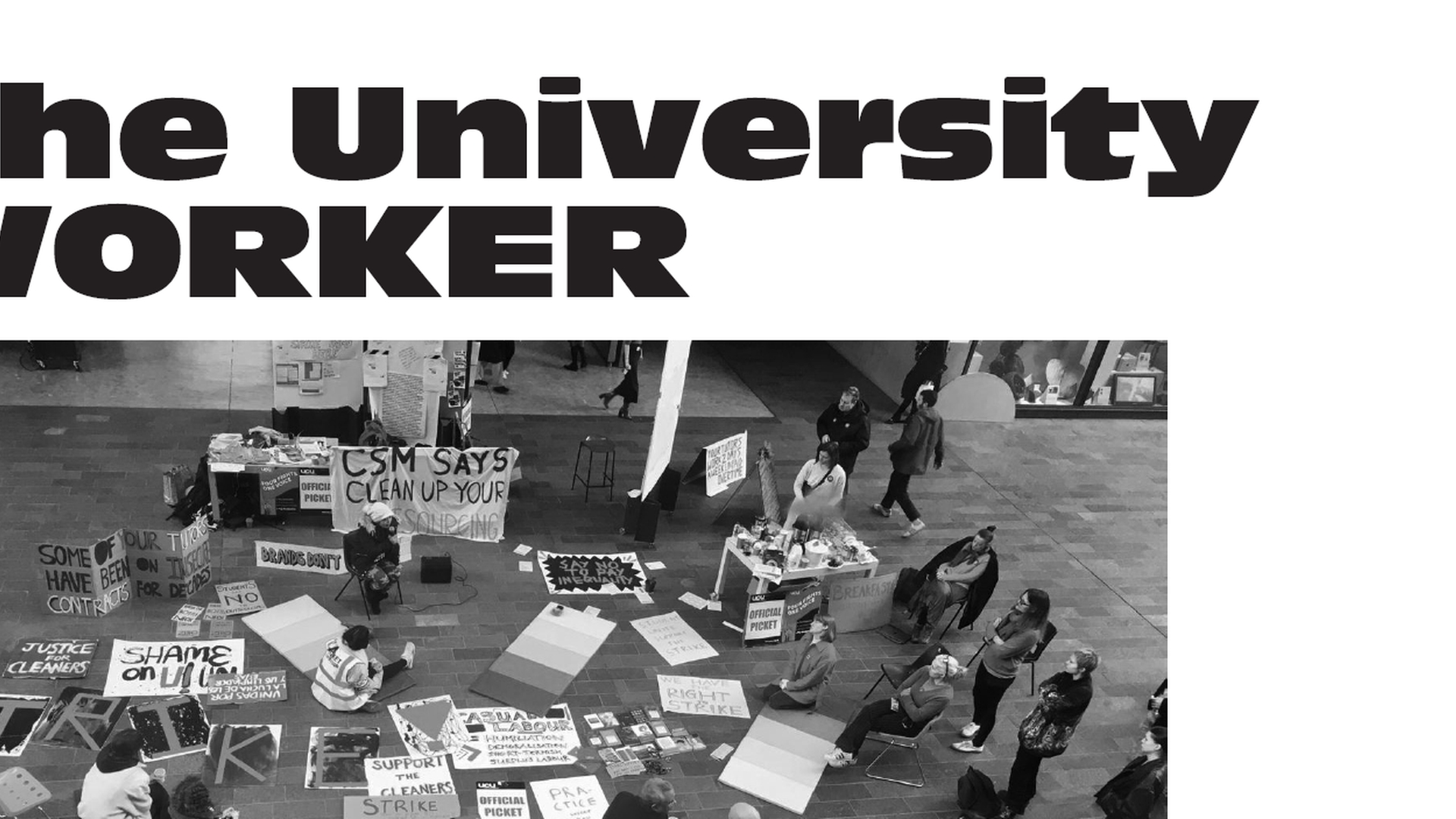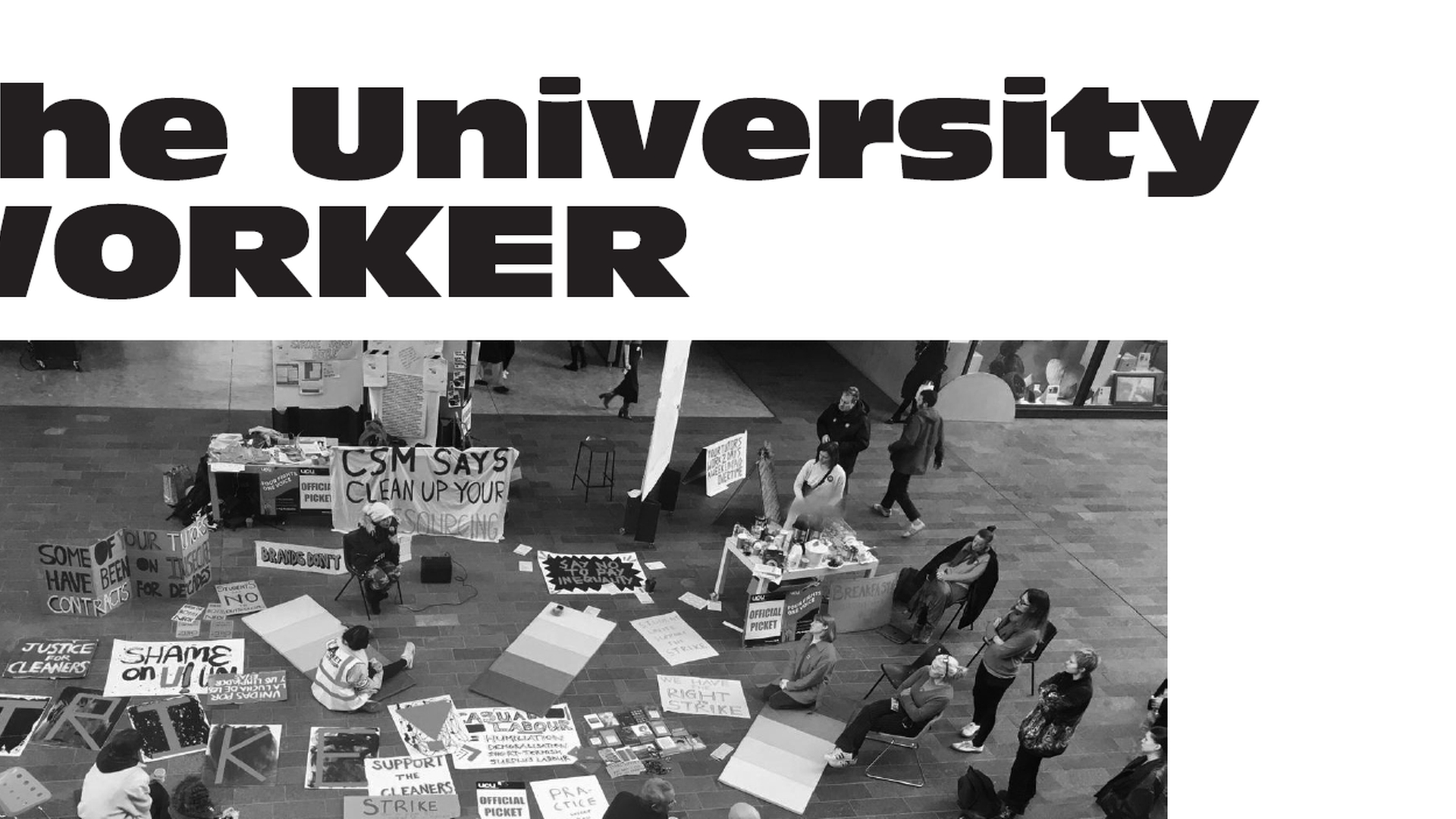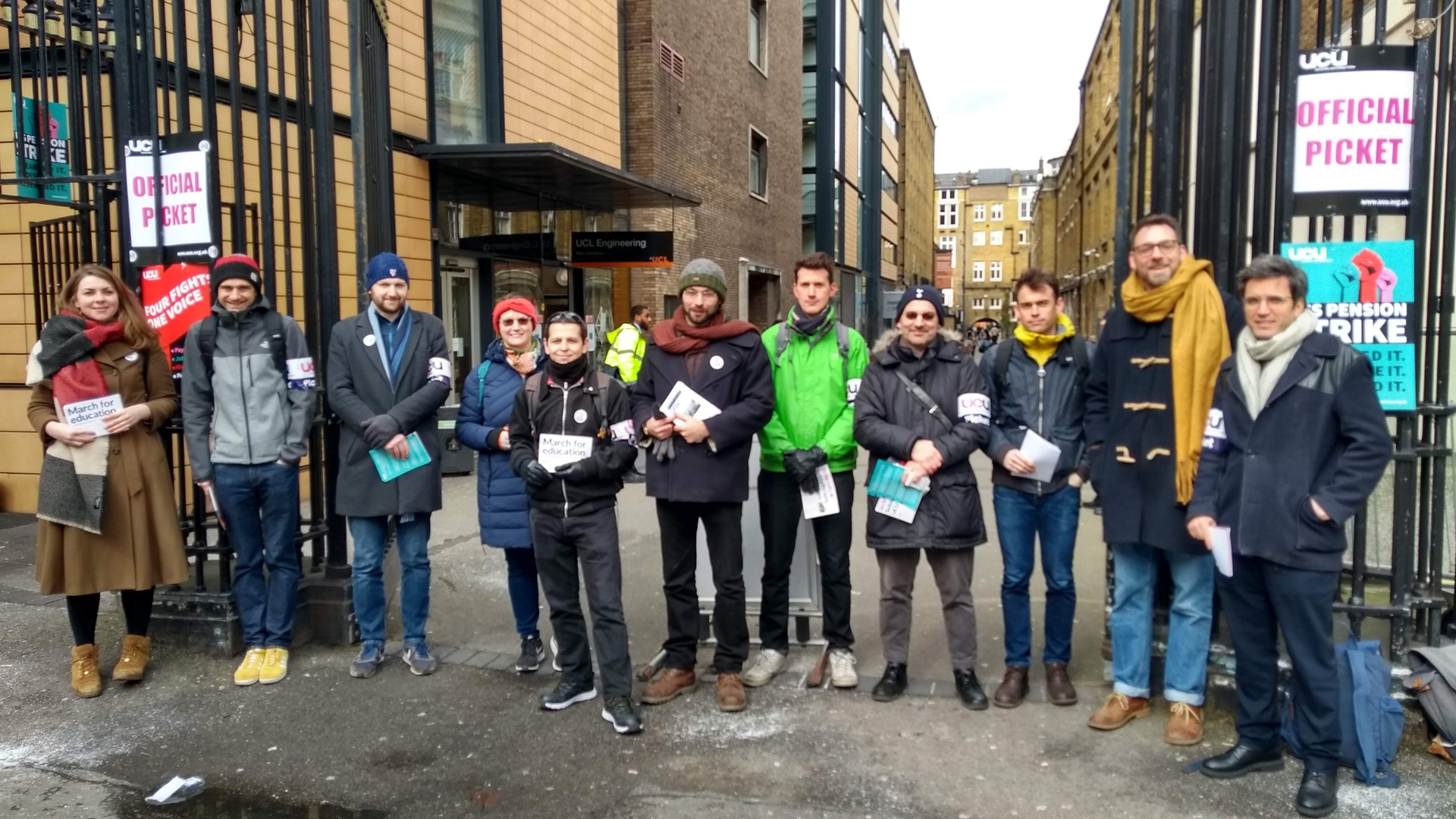The University Worker: Week 4, 2020 reports

bulletins
The University Worker: Week 4, 2020 reports
by
The University Worker
/
March 10, 2020
Reports from different campuses
Is this what solidarity looks like?
Sabrina Shah - SOAS
As we enter the fourth and final week of industrial action taken by 73 Universities across the country, it’s hard not to feel as though something is missing. Student solidarity has been great at SOAS, teach-outs have bought in students from across UoL campuses and students have worked in collaboration with fractional staff members to discuss the future of staff on precarious contracts and the sustainability of teaching at SOAS and other HE institutions across the country. Organising these cross-campus teach-outs, inviting speakers, distributing materials to inform students about the strike action and even ensuring the speakers and microphones are working to ensure a steady stream of Stormzy, J-Lo and Bella Ciao to raise the spirits of the picketers in the rain between teach-outs involves continuous labour; labour that is not fairly distributed.
The responsibility of organising around issues of casualisation, in particular (one of the four fights for the current industrial action taking place) is where solidarity seems to start and end with fractional staff and a handful of students. There are concerns that the demands for secure contracts for precarious workers are being sidelined within the current negotiations, with issues of pay and pension being at the centre of most conversations. Fractionals for Fair Play (FFFP) at SOAS have been revived in the last 6 weeks following SOAS’s decision to freeze paid academic research leave for one year, which by implication will mean there are more permanent members of staff on campus and in the classroom (rather than away conducting fieldwork and research). However, this, therefore, means that there will be less need for fractional teaching staff such as GTA’s, TF’s and STF’s. Fractional teaching staff are on the frontline of higher education and yet are also, in the eyes of the HE system, the most disposable. These precarious roles are occupied disproportionately by people of colour and specifically women of colour. While at first FFFP saw huge support in a schoolwide walkout following the research leave decision in January 2020 from permanent academics, it is clear to see that this support to put pressure on management to reverse the decision was solely for the issue of research leave rather than in solidarity with fractional workers and trying to end casualisation and secure their futures at SOAS.
The marketisation of education and making the relationship between students and teachers transactional, has turned us into customers and our teachers into service providers. Teaching staff being organised within these hierarchical positions ensures that marketisation of education and the ‘cost-saving’ cuts seemingly endemic within this neoliberal business model, absolve permanent academics of their need to show solidarity due to the risk to their own positions which are inevitably next on the chopping block so long as the commodification of education continues to tighten its grip on the HE system under the Tory government. Once SOAS management cut fractional budgets to the bare minimum and realise “savings” must be made elsewhere, they will start making cuts higher and higher up the ladder, protected by their management bubble, sitting on 90k salaries while GTA’s struggle to keep a roof over their head and food on the table. What is most disheartening as a student is the lack of permanent academics on the picket. Why are these professors who position themselves as activists and “left-leaning” not practising what they preach?
Without sounding too bleak, the situation is set to get worse with the looming arrival of incoming Director, Adam Habib. In a letter written by the Academic Staff Association of Wits University, Habib’s current institution, they list a number of issues created under Habib as Vice-Chancellor; many of which echo the situation at SOAS.
“academic staff numbers have not increased in proportion to increased student numbers, and academic staff are now tasked with maintaining research outputs and high-quality teaching while battling with increased class sizes and supervision workloads;”
This echoes the current issues around staff on fractional teaching contracts at SOAS, and where the issue of workload and viewing the university as a business with minimum output and maximum input rings familiar.
“millions of rand were paid in executive bonuses”
Since 2016, the number of directors at SOAS has increased from 13 to 24, with the three pro-Directors earning around £100k and the Director earning around £400k.
“there has been ongoing controversy over the handling of incidents of gender-based violence and abuse”
SOAS has no policy or procedure regarding sexual harassment and abuse. Student-led campaign Account For This have finally managed to get management to the negotiating table to ensure all students on campus are protected against sexual violence.
The fight to ensure job security for our fractional members of staff is only beginning here, and the fight is set to get harder. Solidarity is needed. Permanent academics need to understand that they might be one rung up the ladder closer to management but they are only one rung above the fractionals and are next to be cut.
The picket has become a space for organising for many students on campus, with campaigns such as “Demilitarise SOAS” and “SOAS BDS” falling hand in hand with the struggles we face within the SOAS Academy. The permanent academics seen almost daily on the picket between 9 am and 4:30 pm are the same and can be counted on my hands; those who understand that while any one of us struggles, we all struggle until we are all free and equal - and again, mainly people of colour. Much the same can be said of organising spaces and campaigning on campus. The most visible campaigns on campus are run by the same group of people who realise the interconnectedness of these issues. Collaboration with the Ministry of Defense and giving cultural specialist training to the DCSU has secured £400,000 for SOAS, which is at somewhat of a financial crossroads. Despite SOAS’, supposed ethical investments policy, over £6million is bound up in Israeli firms and businesses, complicit in Israeli apartheid and the continued occupation of the Palestinian people. The schoolwide BDS referendum of 2015 which called for an academic boycott of Israeli universities and was passed by 73% in favour, is yet to be respected by the University. The institution capitalises on the radical social activism of its students and yet securitises the very students fighting against the injustices perpetrated by the very same institution priding the Anarchist symbol on its UG prospectuses with Prevent still operating on campus. SOAS is yet to end casualisation of its workforce. SOAS is yet to put the ‘A’ back in SOAS. The labour distribution among academic and student circles once again fall on the shoulders of those who are most marginalised and oppressed by the racist, capitalist system in which we operate. People of colour, women of colour, Black women, Black Muslim women, are the most marginalised and yet are the ones left to organise and mobilise. This must change.
A few things are clear:
- If you are part of the union and your union are on strike, then you should also withdraw your labour in solidarity with your colleagues. Their fight will also better your working conditions, winning this fight is a win for everyone. If your union branch is on strike, YOU are on strike.
- Going “on strike” means withdrawing your labour and standing on the picket line side by side with your comrades. This does not mean catching up with paperwork from Term 1, answering emails or catching up on rest. Going on strike is by no means easy. The picket is hard work and can often be demoralising. Going without pay is severely damaging, especially for those on precarious, fractional contracts; however, this is when solidarity and fighting for better working conditions for staff and better teaching conditions for students are vital. Scabbing doesn’t stop at physically crossing the picket; do not reply to emails, turn up to the picket and fight the four fights - ALL FOUR FIGHTS!!
- Will the permanent academics please TURN UP?… You must have been on one or several precarious, fractional contracts at one point since starting in academia? You are not above your fractional colleagues who often do the frontline work in teaching your modules and even convening their own…(or even two). Fighting for better working conditions and ensuring job security will benefit you too. What happened to academic solidarity? Practice what you preach and show students how it’s done, even if it means taking a leaf out of our book first and actually showing up to the picket - it’s a good start.
author
The University Worker
Subscribe to Notes from Below
Subscribe now to Notes from Below, and get our print issues sent to your front door three times a year. For every subscriber, we’re also able to print a load of free copies to hand out in workplaces, neighbourhoods, prisons and picket lines. Can you subscribe now and support us in spreading Marxist ideas in the workplace?
Read next

The University Worker: Week 4, 2020
by
The University Worker
/
March 10, 2020

